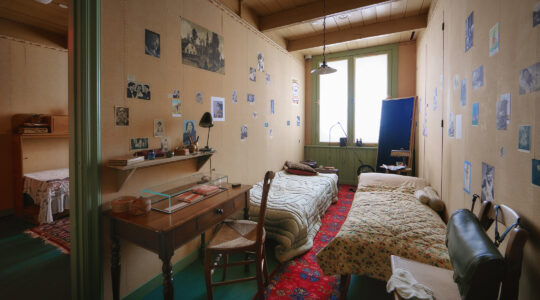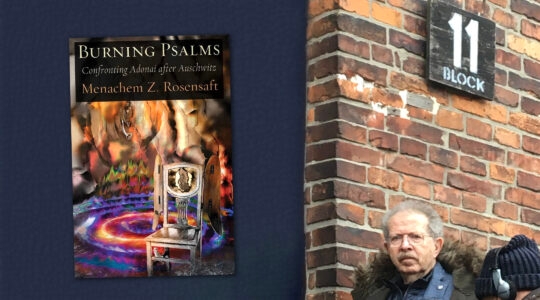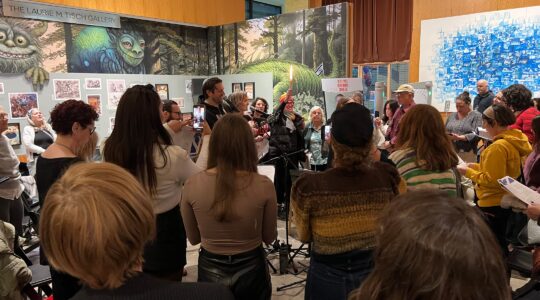A few years ago, it was noted in this space that the heroic age of modernism in film, with its accompanying epic running times, had ended with the 1980s. However, it would appear that two of the world’s greatest documentary filmmakers, Claude Lanzmann and Frederick Wiseman, didn’t get the memo. Their new films, part of this year’s New York Film Festival, which kicks off on Sept. 27, are 218 and 244 minutes long, respectively. While neither Lanzmann’s “The Last of the Unjust” nor Wiseman’s “At Berkeley” are among the directors’ best work, each film has considerable merit, raises deeply troubling issues and rewards the patient and attentive viewer. (See Jewish Week website, thejewishweek.com, for review of Wiseman’s “At Berkeley.”)
Lanzmann has probably dedicated more on-screen time to the murder of European Jewry by the Nazis than any other filmmaker of note — not merely the 9 ¾ hours of “Shoah,” but several other shorter films as well. But even he couldn’t hope to cover the horrifically vast scope of these events, and one suspects that, even at 87, the journalist and filmmaker regrets his many necessary omissions. That would, in part, explain the extensive length of “Last of the Unjust,” which focuses on Rabbi Benjamin Murmelstein and the Terezin ghetto. As Lanzmann says at the outset, the situation of Terezin was unique, and worth a film of its own, particularly given the availability of Murmelstein for an extended interview. Murmelstein was the last surviving “Elder of the Jews,” the third and final bearer of that title in Terezin, and a figure of some considerable controversy after it was alleged that he had collaborated with his captors.
Given the entirely one-sided nature of the power relationship between the Nazis and the Jewish councils they installed as their apparent puppets, such accusations were inevitable but difficult to prove. Indeed, given the circumstances they faced, the “elders” never really had any remotely positive alternatives, other than suicide, perhaps, for dealing with an enemy whose only real intentions were the humiliation and annihilation of their Jewish captives. Unsurprisingly, Murmelstein was finally acquitted of all charges after 18 months of imprisonment.
I, for one, have never felt entirely comfortable judging the motives or actions of these men. Their situation was uniquely untenable, their options all dreadful and the pressures they faced unimaginable. That would seem to be Lanzmann’s position as well.
But in contrast to “Shoah,” whose immense running time is necessary to accommodate the multiplicity of testimonies and viewpoints expressed, “Unjust” is essentially univocal. The only voices we hear in the film are those of Murmelstein, interviewed by Lanzmann in 1975, and Lanzmann himself reading from Murmelstein’s autobiography, published in 1977. The shorter films that Lanzmann carved out from the footage he shot in the 1970s amounted only to the tip of the iceberg of what he had compiled; they were essentially testimony from witnesses to singular moments in the sorry history of the Shoah, with the filmmaker merely adding facts and figures.
On the other hand, “Unjust” is a piece of advocacy in which Lanzmann either echoes or amplifies the voice of a single witness who is given vastly more screen time than any of the other interview subjects in the previous films. It is also, significantly, the only one of Lanzmann’s films on the Shoah in which he uses, albeit briefly, archival images, including footage from the infamous propaganda film “Hitler Gives the Jews a City.”
Murmelstein is ingratiating, smart and hyper-articulate, as one would expect from a former rabbi known for his politesse and his political savvy. He is witty and self-deprecating. What he never seems to be at any point in the film is emotionally engaged. His light, bantering tone seldom changes. In part this is undoubtedly the result of his having told these stories countless times, whether to prosecutors or journalists. But the cumulative effect is disturbing.
Murmelstein’s predecessors were murdered by the Nazis. His rise to the unenviable position of “elder” came as a direct result of their death, and his was the most unwanted of promotions. But neither those events, nor the murder of his fellow ghetto prisoners, nor even the persecutions he endured after the war seem to have left much of an emotional mark on Murmelstein. And the usually tenacious Lanzmann is dismayingly deferential throughout.
As I have said, it’s hard to judge Murmelstein. Lanzmann is another story altogether. I have been unstinting in my praise of his earlier work and continue to be in awe of “Shoah” in particular. But “Last of the Unjust” feels like a lengthy case of special pleading, as if Lanzmann has bought Murmelstein’s narrative without reservations and, for all the interest engendered by hearing a survivor of Terezin describing the innermost workings of the camp, one feels a bit queasy at the film’s end.
The 51st New York Film Festival opens on Friday, Sept. 27, and runs through Oct. 13. Most films will be screened at Alice Tully Hall (Broadway and 65th St.), others at the Walter Reade Theater or the Elinor Bunin Munroe Film Center (both on 65th St. between Broadway and Amsterdam Ave.). For a complete schedule, go to www.filmlinc.com. “Last of the Unjust” will be shown on Sunday, Sept. 29, at 1 p.m. at Alice Tully Hall.
The New York Jewish Week brings you the stories behind the headlines, keeping you connected to Jewish life in New York. Help sustain the reporting you trust by donating today.




